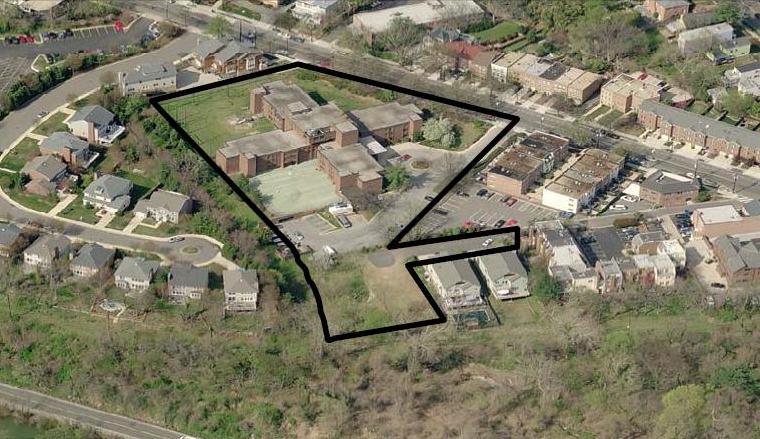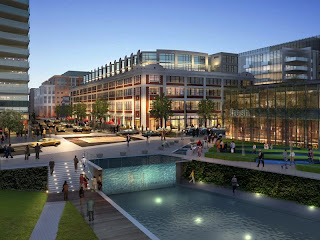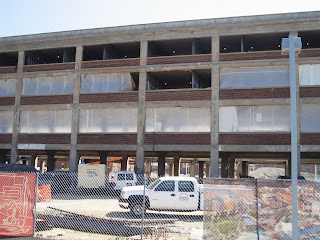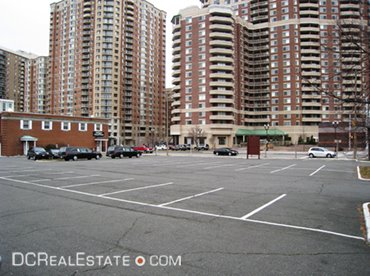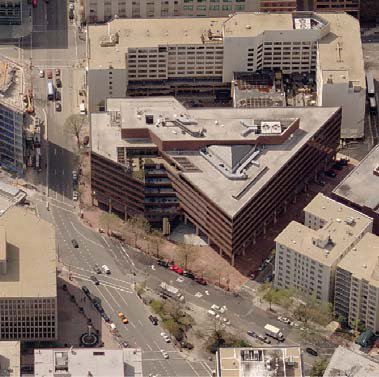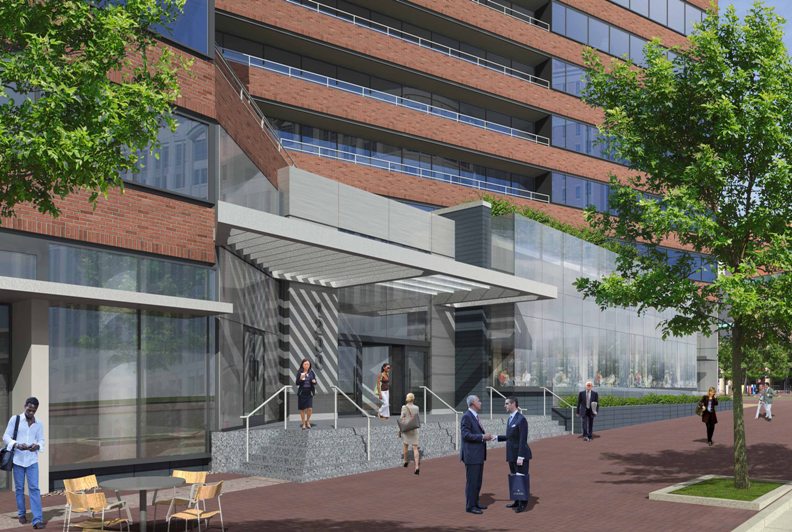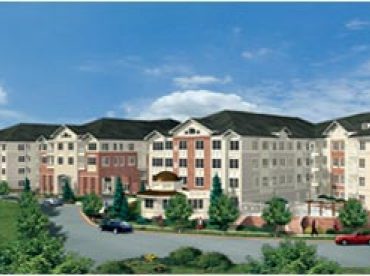 Washington DC's Monument Realty seems to be on top of their game at the ballpark, delivering a 275,000-s.f. office building by the end of the year, owning several other parcels of prime real estate near the stadium, and now having settled their lawsuit with WMATA and Akridge to acquire even more - namely, much of the Half
Washington DC's Monument Realty seems to be on top of their game at the ballpark, delivering a 275,000-s.f. office building by the end of the year, owning several other parcels of prime real estate near the stadium, and now having settled their lawsuit with WMATA and Akridge to acquire even more - namely, much of the Half  Street real estate they don't already own. So why has Monument left its most visible site empty for 18 months? Monument began digging the nearly 2-acre hole across from the ballpark entrance, at the corner of N and Half Street, SE, back in January of 2007. The cavity is the future home to the residential portion of Monument's Half Street project - a 340-unit residential development. According to the developer, financing for the project is still, well, in a hole, but will soon get built.
Russell Hines, Executive Vice President of Monument Realty, said the timing of the dig had to coincide with Monument's adjacent office building. "When we excavated the hole, we did it as part of the office building. It was more efficient to dig both at the same time. We knew we weren't building the residential portion at the time because we weren't done with design or pricing. So we got GMP pricing bids earlier this summer and have been working with and talking to lenders. We are still working on financing for the residential buildings. We started construction but haven't advanced it; we are down at the bottom of a hole. We are looking to be back under construction this year and then complete the project 20 months out," he said.
Street real estate they don't already own. So why has Monument left its most visible site empty for 18 months? Monument began digging the nearly 2-acre hole across from the ballpark entrance, at the corner of N and Half Street, SE, back in January of 2007. The cavity is the future home to the residential portion of Monument's Half Street project - a 340-unit residential development. According to the developer, financing for the project is still, well, in a hole, but will soon get built.
Russell Hines, Executive Vice President of Monument Realty, said the timing of the dig had to coincide with Monument's adjacent office building. "When we excavated the hole, we did it as part of the office building. It was more efficient to dig both at the same time. We knew we weren't building the residential portion at the time because we weren't done with design or pricing. So we got GMP pricing bids earlier this summer and have been working with and talking to lenders. We are still working on financing for the residential buildings. We started construction but haven't advanced it; we are down at the bottom of a hole. We are looking to be back under construction this year and then complete the project 20 months out," he said. Half Street, however, is just one part of the developer's ballpark holdings. The developer has three other sites. Monument owns 50 M, on the Northeast corner of M and Half Street, across from the metro, a site which they are marketing as a build-to-suit or a free lease development. "We have been getting interest from tenants on that - smaller buildings and smaller associations," he said.
 Monument's other holdings are the product of their June settlement with WMATA. The developer will create two more large office buildings on the hotly debated sites that will replace the old Domino's on the corner of M and South Capital Street and the BP gas station at the corner of N and South Capital Street.
According to Hines, Monument will soon begin the zoning process for these buildings. "One of the things it (the settlement) did was finish off a puzzle; there were a bunch of pieces we owned that have come together. Over the next year, we'll be taking both through the zoning commission approval process and that process takes from 6-10 months, maybe as long as a year," he said.
Hines added that the developer will spend most of next year designing and marketing the properties, but will keep an eye on the market. "At that point when we have zoning, we will see where the market is and what we want to do. We have no immediate plans. We have a whole office building to lease on the Metro - we wont run out and build another until we get the first one going."
Half Street's office building is "nearing completion," but has not yet signed any tenants. The entire 775,000 s.f. Half Street project, being built by Clark Construction, will ultimately deliver a 200-room hotel, 50,000 s.f. of retail space, and about 340 residential units designed by Shalom Baranes.
Monument's other holdings are the product of their June settlement with WMATA. The developer will create two more large office buildings on the hotly debated sites that will replace the old Domino's on the corner of M and South Capital Street and the BP gas station at the corner of N and South Capital Street.
According to Hines, Monument will soon begin the zoning process for these buildings. "One of the things it (the settlement) did was finish off a puzzle; there were a bunch of pieces we owned that have come together. Over the next year, we'll be taking both through the zoning commission approval process and that process takes from 6-10 months, maybe as long as a year," he said.
Hines added that the developer will spend most of next year designing and marketing the properties, but will keep an eye on the market. "At that point when we have zoning, we will see where the market is and what we want to do. We have no immediate plans. We have a whole office building to lease on the Metro - we wont run out and build another until we get the first one going."
Half Street's office building is "nearing completion," but has not yet signed any tenants. The entire 775,000 s.f. Half Street project, being built by Clark Construction, will ultimately deliver a 200-room hotel, 50,000 s.f. of retail space, and about 340 residential units designed by Shalom Baranes.
 Monument's other holdings are the product of their June settlement with WMATA. The developer will create two more large office buildings on the hotly debated sites that will replace the old Domino's on the corner of M and South Capital Street and the BP gas station at the corner of N and South Capital Street.
According to Hines, Monument will soon begin the zoning process for these buildings. "One of the things it (the settlement) did was finish off a puzzle; there were a bunch of pieces we owned that have come together. Over the next year, we'll be taking both through the zoning commission approval process and that process takes from 6-10 months, maybe as long as a year," he said.
Hines added that the developer will spend most of next year designing and marketing the properties, but will keep an eye on the market. "At that point when we have zoning, we will see where the market is and what we want to do. We have no immediate plans. We have a whole office building to lease on the Metro - we wont run out and build another until we get the first one going."
Half Street's office building is "nearing completion," but has not yet signed any tenants. The entire 775,000 s.f. Half Street project, being built by Clark Construction, will ultimately deliver a 200-room hotel, 50,000 s.f. of retail space, and about 340 residential units designed by Shalom Baranes.
Monument's other holdings are the product of their June settlement with WMATA. The developer will create two more large office buildings on the hotly debated sites that will replace the old Domino's on the corner of M and South Capital Street and the BP gas station at the corner of N and South Capital Street.
According to Hines, Monument will soon begin the zoning process for these buildings. "One of the things it (the settlement) did was finish off a puzzle; there were a bunch of pieces we owned that have come together. Over the next year, we'll be taking both through the zoning commission approval process and that process takes from 6-10 months, maybe as long as a year," he said.
Hines added that the developer will spend most of next year designing and marketing the properties, but will keep an eye on the market. "At that point when we have zoning, we will see where the market is and what we want to do. We have no immediate plans. We have a whole office building to lease on the Metro - we wont run out and build another until we get the first one going."
Half Street's office building is "nearing completion," but has not yet signed any tenants. The entire 775,000 s.f. Half Street project, being built by Clark Construction, will ultimately deliver a 200-room hotel, 50,000 s.f. of retail space, and about 340 residential units designed by Shalom Baranes. Monument has remained steadfast that despite some challenges, the company is overall healthy. Founder Michael Darby recently told the Washington Business Journal, which had published an article highlighting financial setbacks of the developer, such as its conversion of several condominium projects into apartments, that "we are not in trouble," and that "we have not had trouble finding construction financing for the residential building in the first phase at our Half Street project." (WBJ, June 6, 2008). But with so many impecunious developers stung by the twin evils of lower consumer expectation and heightened financing restrictions, many industry watchers are spooked by any apparent sign of distress. Not so, Monument insists; the show will go on.
Washington DC commercial real estate news









